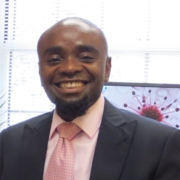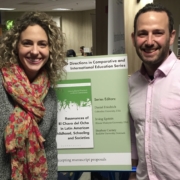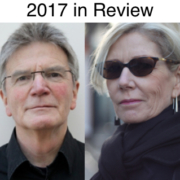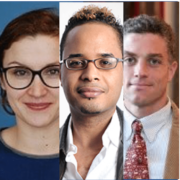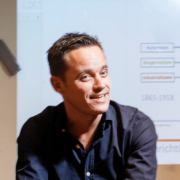The FreshEd Questionnaire, Vol. 2
Books
It’s great to be back after an extended holiday. I’m recharged and ready to go. We have an exciting line-up for the rest of the year, including our FreshEd Flux episodes. Before we start today, I’d like say hello to all our new listeners who may be joining us for the first time as they start their degrees at universities across the Northern Hemisphere. I hope you find FreshEd useful in your studies and please be sure to get in touch! We love hearing from listeners.
Over the past few weeks on holiday, I’ve been doing a lot of reading. It’s been really relaxing. Reading is a fundamental part of education. There’s no way around it. There’s even an idea called “foundational literacy” that is being championed – not without controversy — within international development circles.
But let’s put that to one side. I’m more interested in what people are reading.
Have you ever wondered what some of your teachers or fellow peers are reading?
Today we continue our mini-series called the FreshEd Questionnaire. Over the past eight months, I’ve asked FreshEd guests a set of standard questions after each interview.
These questions ask guests how they approach writing, reading, research, and supervision. These are the day-to-day activities we do inside universities, but perhaps don’t talk too much about them. I want to talk about them.
The first volume in this mini-series, which you should go back to listen to if you haven’t, explored research supervision. It offers great insight and tips for new university students. In today’s episode we explore books. I asked guests who are their favourite writers and why? What we learn is that academics read far and wide. Some stick to academic texts directly in the field of education. Others read non-fiction far beyond the field of education. And still others devour fiction, using it as a source of inspiration in their own academic work.
My hope is by listening to this mash-up of voices you’ll think about your own reading habits and realize the value of reading in education. I hope you enjoy the show!
Citation: Gerrard, Jessica, Martin, Jamie, Oleksiyenko, Anatoly, Robinson, Natasha, Allen, Chris, Popp Berman, Elizabeth, Arathi Sriprakash, Bryan, Audrey, Perry, Laura, Drake, Sean, Rajaram, Prem,Kumar, Cipher, Michael, Rudolph, Sophie, Dryden-Peterson, Sarah, interview with Will Brehm, FreshEd, 291, podcast audio, September 5, 2022. https://freshedpodcast.com/291-questionnaire/
Jessica Gerrard 02:22
Hi, I’m Jessica Gerrard and I work at the University of Melbourne. I’m going to be resistant and not name a specific book but to say that books – for me – are about opening new worlds and new possibilities. And I was someone who started a Ph.D. never thinking that I would do a Ph.D. It wasn’t one of those things that I went through university and thought that this would be my pathway. And in the Ph.D. process books were genuinely opening new worlds and new possibilities. And they challenged me, and they surprised me, and they angered me. And I think that those sorts of books are just so important, including the ones that annoyed me, because they helped me understand what I think about the world more.
Jamie Martin 03:15
My name is Jamie Martin. I’m an Assistant Professor of History & Social Studies at Harvard University. So, I love writers that can kind of subtly and in simple terms, bring out the strangeness of the world. And that can kind of help us to see how what we take for granted as natural or as the way things are, is actually quite bizarre. And so often I actually find novelists quite helpful for this. So, novelists like Olga Tokarczuk, or W.G. Sebald, I think in many ways, have informed how I approach history as much as any actual academic historian.
Anatoly Oleksiyenko 03:52
My name is Anatoly Oleksiyenko. I’m an Associate Professor of Higher Education & Director of the Comparative Education Research Center in the Faculty of Education at the University of Hong Kong. I love to read but if I look into the academic writing, increasingly, I’ve probably stayed more in the academic reading and writing. So, just recently, I am more engaged with William Tierney’s work on organizational culture and academic freedom, Bruce McFarland on ethics and leadership. They make me think critically and challenge some of my previous assumptions or conclusions. Outside my field, it’s Timothy Snyder and Anne Applebaum as recently, they give a great perspective on the Post-Soviet world transformations, crisis in Ukraine. Serhii Plokhy, the Harvard historian, who writes about tough issues of Ukrainian culture and is not afraid to speak about a lot of these types of challenging interpretations within the country. And fiction (English fiction), it’s George Orwell’s 1984, logically- a beautiful book and strong message to current times, I think. And I loved it. Before, I love to read Kurt Vonnegut, if you’ve read translations of Ukrainian writers – very good ones like Oksana Zabuzhko, Serhiy Zhadan, Andrey Kurkov – they give this perspective of intellectual humor, honesty, and love of humanity at the same time. So, it’s kind of an interesting combination of a post-colonial type of rethinking of who you are as a Ukrainian.
Natasha Robinson 05:37
My name is Natasha Robinson. I’m a Postdoctoral Researcher at the Department of Education at The University of Oxford. One of my all-time favorite writers is Jonny Steinberg, who writes about South African society. He’s actually a criminologist by training. But he writes these books, which are often focused around one individual and he takes a very ethnographic journalistic approach to understanding these individuals that kind of encapsulates a larger social trend. I find his writing to be so enjoyable to read. But I always just come away with a much deeper understanding of crime in South Africa, or migration in Southern Africa. And I think it’s just the best of public scholarship.
Chris Allen 06:17
I’m Chris Allen, and I’m an international educational consultant. My favorite writer is George Orwell. George Orwell is someone who had a profound influence on me from a very young age. I was lucky to have a sort of privileged education and I went to private school in the UK. But I read Orwell there for the first time when I was 14 or 15 and it completely opened up my eyes to a whole new world of things. And after reading the usual Animal Farm, 1984, and reading some of his other stuff from his political journalism and so on, and his essays, he’s someone who profoundly shaped the way I look at the world and I like to think that the work I do now in education is very much influenced by how he wrote.
Elizabeth Popp Berman 07:09
Elizabeth Popp Berman, and I am an Associate Professor in the Organizational Studies Department at the University of Michigan. I’m going to pick a writer I like who is somewhat obscure, and I think more people would enjoy – Barbara Pym, who writes mid-20th Century novels of English country-life that are just these really insightful views of people’s character and small-town life and are just a pleasure to read. And I think more people should know about them.
Arathi Sriprakash 07:38
Hi, I’m Arathi Sriprakash and I work at the University of Bristol. I can’t name a favorite book, but I can say that the sorts of books that I enjoy reading the most are the ones that are beautiful and challenging at the same time. I can give you an example of a book that I’m reading at the moment that is that, and it’s Hospicing Modernity by Vanessa Machado de Oliveira. I think it’s because it’s inviting us into rethinking our relationship with the world. And that it’s challenging, it’s confronting, but the book itself is so beautifully written and compelling that I’m approaching that with an openness.
Audrey Bryan 08:18
I’m Audrey Bryan, an Associate Professor of Sociology in the School of Human Development at Dublin City University Institute of Education. I think if I was to think about scholarly works, I think back to those texts that you pick up when you’re starting out as a graduate student, and they really make your head spin. I really love that text, The Sociological Imagination by Mills, it was really the first time where I really understood the interrelationship between private issues or problems and the public realm. But if I was to think about authors more broadly, or thinkers who have shaped my understanding of the world, I have to say, I really love Kazuo Ishiguro’s work. His most recent novel, Klara and the Sun, has just really blown my mind in terms of the real emotional provocativeness to it but also just that keen ethical sensibility. There’s really nothing like it. It just stands out for me in terms of raising profound questions about the human condition and is one of the few authors that really makes me cry. You know, I was literally in bits by the end of Klara and The Sun. I just found it so provocative, so profoundly affecting.
Laura Perry 09:45
I am Laura Perry, based at Murdoch University, in Perth, Western Australia. It’s hard for me to really just pinpoint one person. Definitely, there’s some academics that work almost exclusively with the writings of Foucault, and their whole career is targeted around one particular theorist, and that’s certainly not me. But I guess in terms of writers and thinkings that have influenced my own interests in how I see the world, I really like David Berliner, I really like Stephen Ball, of course, and Linda Darling-Hammond. I guess those three would probably be coming up for me right away. Stephen Ball, for his kind of insights about how the middle-class needs education, more than working-class families, to reproduce their social standing and your social status. So, it’s not so much that they value education more because they’re superior and more enlightened parents but it’s that they need those qualifications in order to stay at the same level in society from generation to generation. And this gets back to this idea of education as a social leveler versus a reproducer of social inequality and the fact is, it’s both. Education is the main mechanism for social mobility in modern societies more so than -it’s not like feudalism. It’s not like back in the day when you were born into a certain station. We do have, of course, a lot of barriers, but more or less in modern societies, education is available and accessible. Yes, there are differences in quality sometimes, or oftentimes but nevertheless, upward mobility is certainly an option through education for most families. But at the same time, education is the main tool for maintaining your status, which means maintaining inequality if it’s there. And this is the reason why certain families will send their kids to certain schools to maintain that. So, Stephen Ball’s insights about all of that – the class advantages and competition – I think, for me, is really interesting. I love David Berliner’s work for the emphasis on the larger kind of political and social contexts that shape education and schooling and what happens in classes and his insights about educational achievement are very largely about what happens outside of school. And not just what happens inside of schools. I love the work of John Ogbu as well, about the idea of how a groups’ position in society influences their achievement in schooling. And so, if we look at any country across the world, students from marginalized oppressed communities are almost always going to be having lower results in schooling. And that’s a universal phenomenon. And why that is, is interesting to think about. And of course, as well, there are the anomaly groups that trend -that’s interesting. So, and I guess the last one would be, like I said, Darling-Hammond. I love the idea of holding schools accountable and holding policymakers accountable for ensuring that equal opportunities, or at least, equitable opportunities are presented to all students.
Sean Drake 12:41
My name is Sean Drake, and I’m an Assistant Professor of Sociology at Syracuse University and I’m also a Senior Research Associate in the Center for Policy Research also at Syracuse. I have favorite academic authors and non-academic authors. I think my favorite academic author is probably Elijah Anderson, who is a Sociology Professor at Yale. I’ve learned a lot from him personally but also just in terms of reading his work. And I think what I like about him is just his gift of storytelling. Just the way that he sort of draws you in, drawing on his own experiences and the work that he does. He’s a scholar of race and racism and low-income, segregated, Black neighborhoods in the United States. So, I think, for me it’s just his storytelling ability. And then, non-academic authors, I would say V.S. Naipaul is one of my favorites. He just has an amazing story. His family’s from India, but he’s British. He was born in Trinidad, and he just writes about his experiences traveling the world and in different cultures. And I’ve learned a lot from him just sort of stylistically -his use of punctuation, his ability to sort of put you in the scene. It’s very ethnographic in the way that he writes. I also admire Barack Obama as an author kind of for similar reasons. And then actually, I’d be remiss for academic authors if I didn’t mention WEB DuBois, who’s kind of the really the founding father of ethnography in American sociology and he sometimes doesn’t get the credit that he deserves for that. So, I’d say those would be my four – Elijah Anderson, WEB DuBois, Barack Obama, and V.S. Naipaul. Those are my favorite authors. And I should say as I’m thinking about it – Zora Neale Hurston and Toni Morrison as well. I love both of them. So, it’s hard to just pick one. Now, I’m up to six. Those are the six that I find myself coming back to and just being inspired by.
Prem Kumar Rajaram 14:47
My name is Prem Kumar Rajaram. I work at the Central European University. If it’s an academic book, it would be Raymond Williams, Marxism and Literature. If it’s a non-academic book, it would be maybe the book called The Hidden Words, which is a Bahai text. And then fiction would be a book that I always read every few months, A Suitable Boy by Vikram Seth. Marxism and Literature because I mean, it changed my way of thinking about power and the way power operates. The Hidden Words because it’s a space of spiritual peace that I find when I read it. And A Suitable Boy because it’s a lovely sweeping fictionalized history of India that’s written in a very accessible and engaging way.
Michael Cipher 15:33
I’m Michael Sciffer, I’m a Ph.D. student and I also work as a school counselor. My research is very much focused on looking at our school segregation effects and the effects of school contexts on the effectiveness of school systems. It’s hard to pinpoint, I was thinking carefully about this question. But for me, I guess one of the influences on my academic thinking is the 19th century, new liberals from Britain or social liberals, as they became known. They argued for the role of state intervention to ensure liberal society was accessible to all members of the community. And their writings were quite influential here in Australia. At that time, we weren’t a federation, we were separate colonies. And that’s when public education was being established. And that sort of thinking was a big influence on the establishment of public education in the colonies here. But one person in particular Sir Henry Parkes spoke about the children of property owners learning side by side with the children of day laborers. And it was that idea of the state intervening to ensure the ability of all people to enjoy a liberal society.
Sophie Rudolph 16:40
Hi, there, I’m Sophie Rudolph, I work at the Melbourne Graduate School of Education at the University of Melbourne. The writers that I value are the ones that move me, that challenge me, and helped me understand something that is difficult, and so there’s something that is nourishing about it as well. And there have been so many over my time. But one that did this very early on was bell hooks and Teaching to Transgress, which I read in my undergraduate days. And so, I think it’s that capacity to give insights that are meaningful and help understand the things that are so challenging and difficult. That’s important to me.
Dinur Blum 17:31
I’m Dinur Blum. I’m a lecturer in Sociology at California State University in Los Angeles. So, I’ve got a few and I know it’s a little bit of a laundry list. But I absolutely love working with Dr. Adam Sanford and Dr. Stacy Smith. I’m fortunate enough to have published with them on some of the social fallout of COVID-19. They’re incredibly creative, they’re incredibly encouraging, they’re incredibly motivated, they’re driven. I love working with them. There’s Caraway Carter, who writes a lot of romance and I’m lucky enough to know him. I get to see the effort and the consistency that he puts in. I also love his blunt honesty, where he will read parts of his books to us and ask us for feedback, and he says is this okay? A couple of other books and authors that I really enjoy, I’m right now reading Jonathan Mahler’s Ladies & Gentlemen, The Bronx is Burning. And that’s looking at New York City politics in the ’70s and kind of the culture wars and looking at within the context of the Yankees, The Reggie Jackson and Billy Martin, the fight. So, it’s kind of putting those contexts against the racial background of what was happening in New York in the late 70s. And I think it’s really fascinating. There’s Dr. Alberto Testa, he writes about Italian football and fascism and I always thought that that was super creative of looking at sport through politics, even though we know, around the world that sport and politics are very closely linked. I think he does a really fantastic job of linking it to the supporters’ groups. And then the last author that I’m going to shout out is Dan Ariely. He’s a social psychologist and what I love about his work is not only does he do a huge volume of studies, but he is able to convey his studies to a really wide audience, and he’s able to break down ideas into really easy, digestible pieces. And I think it makes everyone feel like they’re in on this knowledge with him. And I think that that’s the mark of a great writer is you’re bringing people into your ideas, and you’re making them feel like oh, yeah, we knew this all along with you. You just highlighted it for us.
Sarah Dryden-Peterson 19:31
I’m Sarah Dryden-Peterson, an associate professor at the Harvard Graduate School of Education and director of Refugee REACH. I always used to hate it when teachers would ask me this question because it felt like an unfair narrowing of the many different writers who I wanted to read but I think I love reading fiction. I write nonfiction but I love reading fiction and I think I’m really inspired in my nonfiction writing by reading great writing and particularly getting to know characters who live in me long after I finished reading the book and allow me to have new, big thoughts. And I think one of the kinds of authors from my childhood who really played that role for me was Lucy Maud Montgomery, who is the author of Anna Green Gables. I grew up as a redheaded Canadian, was deeply identified with this child who I wanted to be like: who was strong, who was brave, who was radical for her time, and who just loved deeply and found ways to build connections with people who were hesitant to build connections with her. And some of the new authors that I have just loved in a very similar way over the last few years include the book, Happiness by Aminatta Forna, The Old Drift by Namwali Serpell and, very recently, The Wrong End of The Telescope by Rabih Alameddine.
Want to help translate this show? Please contact info@freshedpodcast.com
Recommended Books
Nineteen Eighty Four – George Orwell
Hospicing Modernity – Vanessa Machado de Oliveira
The Sociological Imagination – C. Wright Mills
Klara and the Sun – Kazuo Isighuro
Marxism and Literature – Raymond Williams
Ladies and Gentlemen, The Bronx is Burning – Jonathan Mahler
Anna Green Gables – Lucy Maud Montgomery
The Old Drift – Mamwali Serpell
The Wrong End of the Telescope – Rabih Alameddine
The Hidden Words – By Bahá’ u’ llá’h
Teaching to Transgress – bell Hooks
Recommended Authors
William Tierney
Bruce McFarland
Timothy Snyder
Anne Applebaum
Johnny Steinberg
Kurt Vonnegut
Oksana Zabuzhko
Serhiy Zhadan
Audrey Kurkov
Barbara Pym
David Berliner
Stephen Ball
Linda Darling-Hammond
John Ogbu
David Berliner
Elijah Anderson
V.S. Naipaul
Barack Obama
W.E.B. Dubois
Zora Neale Hurston
Toni Morrison
Sir Henry Parks
Adam Sanford
Stacy Smith
Caraway Carter
Alberto Testa
Dan Ariely
Have any useful resources related to this show? Please send them to info@freshedpodcast.com


